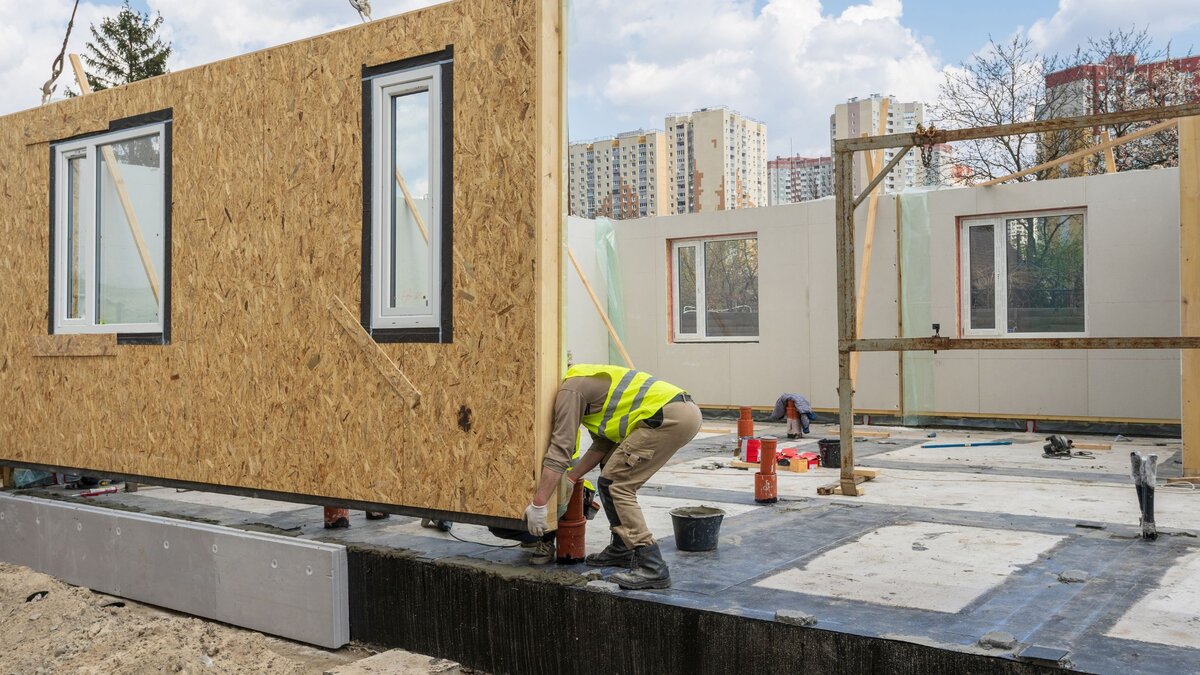
Modern Methods of Construction (MMC) – it’s a popular concept in construction, but MMC is no mere buzzword; schools and hospitals have already been built using this divergent, innovative practice.
This new way of construction has really surfaced as a transformative force. It’s natural then that there should be knock-on, far-reaching implications across the industry, including an impact on insurance.
At BuildSafe we’ve analysed the trajectory and potential of MMC and thought it’d be helpful to talk about its definition, importance, challenges, and how all this affects structural warranties.
What is MMC and Why Does It Matter?
MMC refers to innovative new ways of building, distinct from traditional construction. These methods often centre around off-site manufacturing and assembly, which could mean factory produced panellised units, volumetric modular units, or hybrid techniques. MMC’s inherent emphasis on controlled environments and mass production aims to enhance quality, consistency, and the overall efficiency of construction projects.
The significance of MMC in the construction industry is profound. The practice has been key in attempts to address tough challenges such as housing deficits, labour shortages, and global warming.
Through streamlining construction, MMC can enable quicker, cost-effective building without compromising on quality. With a focus on sustainability and efficient resource use, MMC stands out as an essential part in modernising construction, proving more adaptive to contemporary demands and challenges.
MMC’s impact on Structural Warranties
Structural warranties, basically, are insurance policies for newly constructed properties, covering any defects in their design, workmanship, or materials. With MMC, since new materials and techniques are introduced, the criteria and benchmarks for these warranties might be reassessed, and this transformation has effects on the construction industry.
MMC’s controlled environment and standardised procedures, in theory, should produce buildings with greater consistency and potentially fewer defects. In turn, this could lead to a reduction in claims made under structural warranties. This consistency can also make the underwriting process smoother, as insurers may feel more confident about the reduced variability in construction quality. If MMC methods prove to be reliably more robust over time, it could even lead to a reduction in premium costs.
But since MMC represents a departure from traditional construction techniques, there is inherently less historical data available on the long-term performance and durability of MMC builds. Insurers typically base their risk assessments on historical data, and without this, there might be a higher degree of uncertainty, potentially leading to more cautious underwriting with higher premiums.
There’s also a potential skills gap issue. If issues do arise in MMC structures, there might be a lack of professionals trained in these specific techniques to rectify them. While traditional building repair skills are widespread, MMC-specific skills may be concentrated among a smaller group of professionals.

How Have Structural Warranties Evolved?
The evolution of structural warranties has closely mirrored the transformation of the construction industry. Historically, traditional methods of construction were prevalent, which had tried-and-tested techniques with known risks and predictable outcomes.
Structural warranties in that era were based on a relatively stable and mature understanding of conventional building techniques. This predictability resulted in warranties that were straightforward, often focusing on well-understood defects or issues that could arise over time.
Along comes MMC and the dynamics shift. All these exciting, inventive techniques might well offer efficiency, cost-effectiveness, and environmental benefits. But these new ways of building naturally mean there’s risks and uncertainties.
Structural warranties are having to evolve and adapt to these. The unknown long-term performance of novel methods, the use of unfamiliar materials, and the potential lack of skills in handling demand a more nuanced approach to insurance.
In today’s world, structural warranties are more complex, with a sharper focus on the unique attributes and potential vulnerabilities associated with techniques like MMC.
BuildSafe Is There for You
Buildsafe’s dedicated team recognises the complexities and nuances associated with MMC and the impact this can have on structural warranties. We have a deep understanding of the intricacies of MMC and are primed to offer invaluable guidance and support to developers facing challenges and opportunities brought by emerging methodology
When it comes to brokering structural warranties, BuildSafe stands apart in its commitment to delivering bespoke solutions tailored to individual needs. Let’s be frank: how you build it is for you and the compliance team to figure. All that matters for your insurance is that you’re genuinely covered.
Our consultants really analyse your project’s specific requirements and constraints to ensure the warranty provided aligns perfectly with the developer’s objectives. This meticulous approach, coupled with our vast industry connections and expertise, ensures you not only get the most favourable terms but also a warranty arrangement that offers real protection and peace of mind.
Does that sound like a good idea? Contact BuildSafe today and we’ll tell you how we can get you a structural warranty that protects you, whatever the build method.

